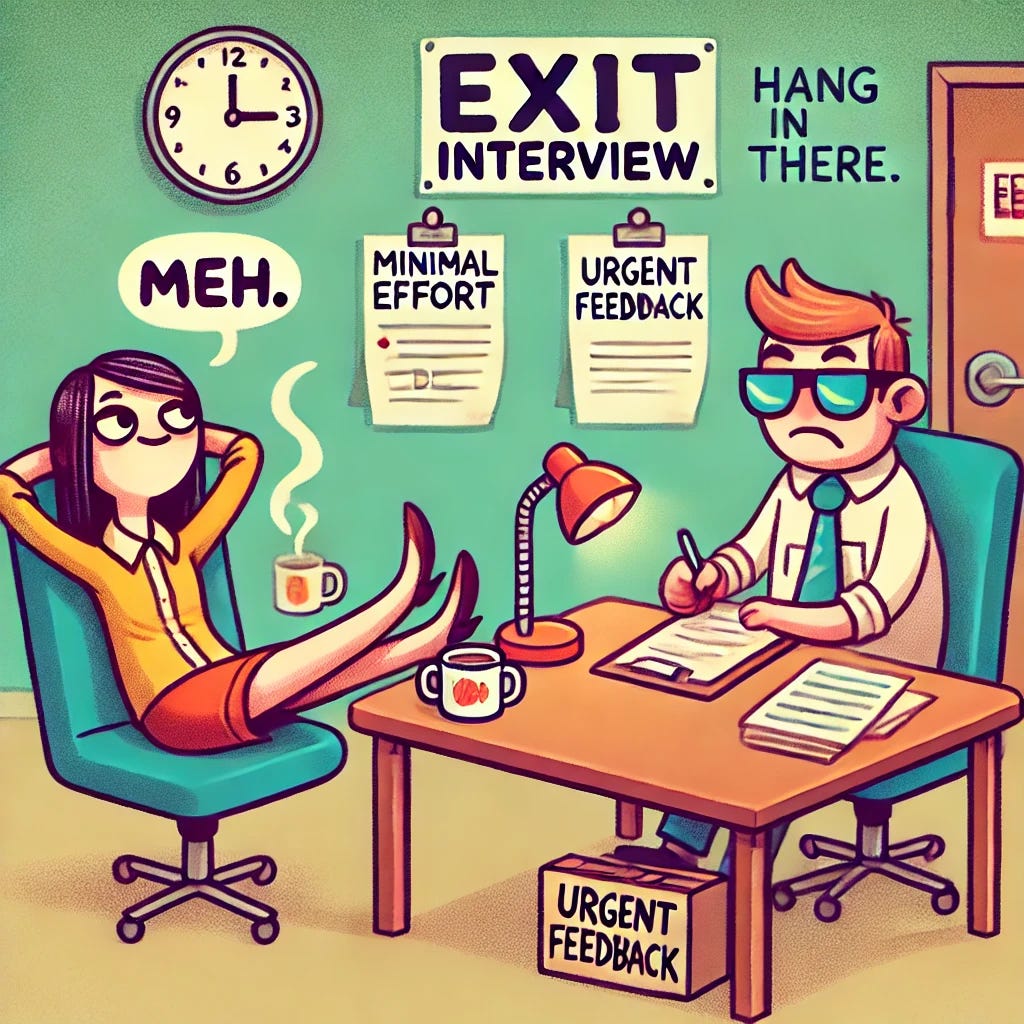So you are quitting your job? Congrats!
(I truly mean that. You are walking away from something that no longer serves you but once did. Most people are too scared or brainwashed to make that move.)
Exit interviews can be whatever you want them to be. The stakes could not be lower. You are literally leaving for another opportunity. You have already decided there is nothing more for you at this company. You hold all the leverage, not your employer. In fact, this might be the only time in an employee relationship where you have more power than the employer. That is why, after you give your notice, it feels like a massive weight, the emotional equivalent of your ancestors’ trauma, is lifted off your shoulders. It is a moment of true freedom and liberation.
The exit interview should be your least stressful work meeting ever. So why does it still feel so stressful?
Sponsors of this Substack
LazyWork
Keep your work laptop active and simulate working without getting caught by pesky time trackers.
Ra Optics
Shop my yellow lens glasses for THE best blue light blocking and mood boosting and the cutest look. Use code: ANTIWORK for 10% off
(I am gifted dozens of glasses all the time these are hands down my favorite!!!)
Notion
Notion is the free, ultimate all-in-one productivity tool that helps you effortlessly organize your life, work, and goals in one place!
You.com
You.com > ChatGPT
Free plan: Get 4 different AI modes (Research, Genius, Test, GPT-4)
Paid plan: pay one subscription and receive premium subscripts to Chat GPT-4o, Claude, and much more!
Well, quitting is weird. Giving notice is always awkward. You are rejecting someone and taking a risk on another opportunity. And this new opportunity does not have the data yet to prove it was a good decision. So you are sitting in uncertainty while telling an authority figure, your boss, that you no longer want to work here.
It is awkward. It challenges a lot of the status quo we are expected to adopt in the workplace.
I love exit interviews. I am always trying to improve my confrontational skills. I was raised in an environment where confrontation or communicating inconvenient emotions was not allowed. So I am always finding new, low-stakes opportunities to practice my assertiveness in positive, professional ways.
I have shared a little bit about my exit interview experience and why both times I gave my notice were during performance interview meetings in Work Whistleblowing episode 15.
Watch here ⬇️
Here are five ways to make exit interviews a little less lazy.
These are not crunchy, typical career advice suggestions you will find from some LinkedIn influencer that perpetuates being a Corporate Pick-Me, even in your last moments. These are real suggestions you can use any time you choose to move to another external opportunity.
Answer Questions with Copy Paste Energy
Highlight how to reuse phrases and boilerplate answers that will not stir the pot.
Example: Respond to “What could we have done to retain you?” with:
"I have grown a lot here, but it is time for a new chapter."Suggest using vague, non-confrontational language that saves time while keeping the interview low effort.
Flip the Script on Feedback
Turn the session into a brainstorming session for yourself rather than offering genuine feedback.Example: Politely redirect questions back with,
"What do most people say to this? That is interesting, tell me more!"The goal: Let the interviewer talk more while you do less.
Do the Bare Minimum Prep
Arrive with a mental list of three neutral, easy to remember phrases like:
"I loved the team."
"It is just the right time for me to move on."
"I wish you all the best!"Make it seem polished without putting in any real emotional or cognitive effort.
Treat It Like a Transaction
Frame the exit interview as purely procedural, not personal.Suggest things like keeping answers concise, focusing on logistics like final paychecks or benefits, and avoiding deeper discussions.
Pro tip: Bring a coffee or snack to project "just here to check this off my list" energy.
Outsource Emotional Labor
Recommend tools or methods to keep the conversation short and sweet.Example: Bring notes you prepared beforehand to stay on script.
Bonus: Use AI tools to draft a "professional but lazy" feedback statement.
Frame this as a way to protect your energy while still fulfilling your obligation.I teach my students how to do this with AI all the time in my Autopilot 9-5 Blueprint.
I told you this post is not about being a Corporate Pick-Me.
Exit interviews are, in my opinion, primarily for companies to assess if any unethical actions occurred or to prepare for potential lawsuits. Yes, there are growth-oriented companies that genuinely analyze exit interview feedback, identify patterns, and improve. But for the most part, they just want to know why you are leaving.
You can share as many or as few details as you desire. Here are some anti-work ways to navigate questions you do not want to answer without using too much brain power.
Xoxo,
Gabrielle





